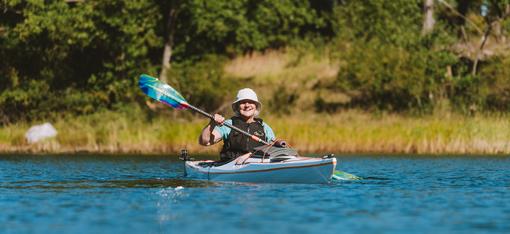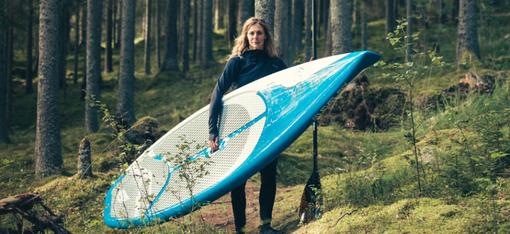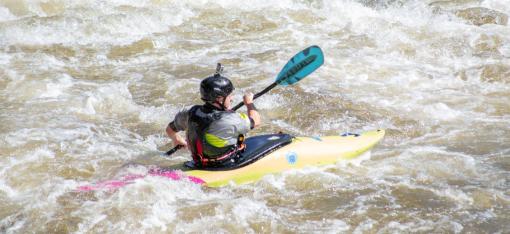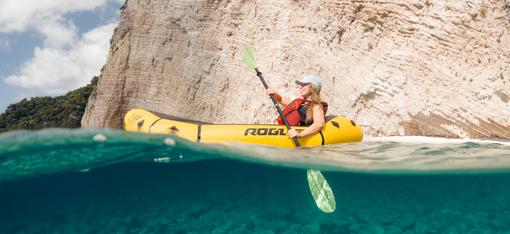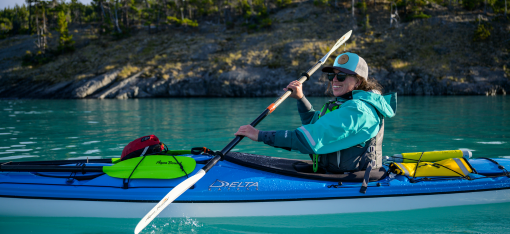Canadian Adventure Race Team Partners with Aqua Bound
11-minute read
When Canadian wildland firefighter, Ben Kwiatkowski, contacted us about a partnership with his adventure racing team we were excited to jump on board with them. We knew our paddles are tough enough to help them compete with the world’s best.

Taking on some rapids during Expedition Canada (Photo credit: Nathan Karsgaard)
We were able to catch up with Ben for a Zoom interview to hear about his team’s recent races and learn more about the ultra-hardcore adventure racing world:
What is Endurance Adventure Racing?
As Ben explained, the sport of endurance adventure racing was popularized during the Eco-Challenge TV series of the late 90s and early 2000s (its founder would later create the reality show Survivor).
The races are nonstop, multi-day events, often over hundreds of kilometers and in remote wilderness areas. They involve a variety of sports that can include trekking, trail running, climbing, swimming, biking and paddling.
There’s not a set course, but rather checkpoints each team must reach along the way. The checkpoints could be a few hundred meters apart or many kilometers apart. A compass and map are the only navigation tools allowed—no GPS or smart phones.
The Adventure Race World Series (ARWS) governs the rules and organizes the biggest races around the world. There are also shorter and more localized races.
“They were taking applications for the 2019 [Eco-Challenge] race in Fiji,” said Ben. “My friend and I, who had done a couple races, heard about this and thought, ‘Why not? Let's throw our names in the hat, see if we can get a spot.’ So we put in an application.
“Tom and I, along with our friends, Elora and Jasper, formed a team. We were all wildland firefighters together [in northwestern British Columbia]—all working at the same base. We thought we would have a great team for it, and they accepted our application.

Peak Pursuit team members: Ben, Tom, Jasper and Elora (Photo credit: Brian Finestone)
“So we just jumped into it with both feet. We went over to Fiji, having no idea about this expedition adventure racing—and we loved it. A third of the teams didn't make it to the finish line, but we managed to finish. We were bumped, battered, bruised, bleeding, crying and lost weight, but we got to the finish and we were hooked.”
The Importance of the Team Dynamic
The team dynamic is extremely important in adventure racing. Teams are comprised of four people and must be mixed-gender. The entire team must stick together for the duration of the race. If one needs to leave due to injury or illness, the team is disqualified.
While the teams compete with each other for speed and/or getting to each checkpoint, they also compete in very real ways with the weather and the wilderness itself.
Ben said, “What keeps us involved is that we like to race together. We're a very tight crew, having spent so much time together working and recreating. We can get a sense of each other as we're moving together about each other’s needs, how hard to push, when we need to stop, when somebody needs a snack, when somebody just needs a hug.
“We can engage each other in thoughtful and meaningful conversation when we're in those dire straits—whether it’s pushing a bike through deep snow for 50 kilometers or it’s Night 4 and we're hallucinating.
“Then there's the sport dynamic where sometimes you see the other teams as adversaries, but more often you see them as your comrades. You're fighting against this course. We’re competing against these other teams, but when we run across them we share snacks and talk about the race.
“In Oregon when things were not looking good and teams were in danger, we put our race on hold and helped other teams. And that goes back and forth. That sort of connectedness within this sport community is quite special.”

Ben and Kiah on the final stretch to 1st place (Photo credit: Joel Perrella)
Recent Races with Team Peak Pursuit
Ben and his team are called Peak Pursuit. They entered and completed two AWRS endurance adventure races in 2021 and 2022:
Expedition Canada • Fall 2021
400 km Expedition Canada was set in the mountains of southern British Columbia. It included about 90 km of paddling along with mountain biking and other sports.
The two paddling sections were both on Lake Okanagan, one on Day 1 and the other near the end of the race.
“When we started out, we were going downwind and had great conditions. We were surfing waves. There was maybe a foot swell on the lake so it was pushing us along quite well,” Ben said. “We had to find two checkpoints. One of the checkpoints was quite easy. But because we were going so fast, we overshot the second one.
“We spent an hour or two looking around on the slope for this checkpoint. And of course, with map and compass, we can't confirm our location—we’re just making our best guess. After some time that we realized we were in the wrong spot.
“We found the checkpoint, and then the sun started to set and the winds really picked up. It turned into two-to-three foot swells that we had to paddle against. It was extremely difficult paddling and quite cold at that point, having dropped into the single digits [Celsius]. And we were getting wet with all the spray. It was one of the most difficult paddles I’ve done.
“We were pushing so hard that our metabolism was high, and our body temperature was high, but as soon as we landed on the other side hypothermia set in. I had to strip all of my clothes off, get under some warm blankets and shiver for about half an hour to let my body temperature come back up.

Ben’s Instagram post after Expedition Canada (Photo credit: Nathalie Long)
“And, of course, being this style of racing, this was just the start! We were back on the trail and off through the night for an approximately 50-kilometer trek next.”
A couple days later after several biking, trekking and climbing sections (including ascending a mountain in the snow), they did their second paddle, starting at midnight.
“That's when the hallucinations started to kick in from the sleep deprivation,” said Ben. “We could see the lights of the city along the sides of the lake. They were turning into these shapes that were animated and moving around!”
Ben and his team use Aqua Bound’s Shred Apart whitewater paddles that can be used either as two canoe paddles or one kayak paddle. On these long stretches of flatwater they found that using them as kayak paddles in the canoes produced the greatest speed for them.
Expedition Oregon • Spring 2022
There were three paddling sections in the 500 km Oregon race, all with tandem packrafts. This race was one of the most technical the team had encountered because of an unexpected spring snowfall. Not only did it dump a lot of snow on the course, it increased the water levels on the rivers.

Deflating the packrafts after a paddling section (Photo credit: Jon Gedney)
“The organizers adjusted the race times so we started in the evening for the race, so we would get on the packrafts first thing in the morning,” said Ben. “We wouldn't be in the whitewater at night. For this section we had sustained Class 2 with maybe a dozen Class 3 rapids and one Class 4.
“All of us swam multiple times—it was quite adventurous! We came across other boats that had flipped or had holes in them. One boat was pinned against a streamer and had to be pried out. It was quite safe, though. Fortunately, all the rapids we paddled spilled out into relatively safe water without a lot of hazards, especially with the high water.
“When we swam, we were able to flip our rafts right back over and get back in. And of course, the most important thing with whitewater is to hang onto your paddle!”
“This is where the Shred Apart paddles were huge for us. The front person used it as a kayak paddle for power, and the stern person used it as a canoe paddle to steer with. And we always had that extra blade and shaft along.”
The bike section that should’ve taken them 10 hours took 20 because they had to push their bikes through the deep snow. Then they put on snowshoes to trek over an 8,000-ft mountain, which brought them to their next paddle. The lake was small, but it was snowing so hard they couldn’t see the other side.

(Photo credit: Jon Gedney)
“There was one team we saw at the very top of the mountain that was hypothermic. We had to help them down the mountain because they didn't know where they were going. Then they didn’t inflate their packraft properly and dumped in the middle of the lake. Fortunately, we all carry emergency communication devices. They called for help and were rescued.”
The race ended with a final packraft section, this time at night:
“At this point we were in fourth place, so it was full power. We were pushing as hard as we could on day five, with no sleep, and losing body weight.
“The earlier part of the river was quite flat. Then in the second part were a couple of rapid sections. We knew one piece was about Class 3, and we wouldn’t have a chance to scout it.
“It was pitch black by this point. Our conundrum was: Do we paddle it, knowing it’s faster, but with the risk of dumping and maybe injury? We elected to portage around it, as did all the other teams. It wasn’t worth the risk.
At the end of the river, the teams jumped out of their packrafts, grabbed their paddles and sprinted the last couple kilometers to the finish line. Peak Pursuit ended in third place.
Ben said, “We did it in 5-1/2 days on only seven hours of sleep. And over that length of time, we were only five hours behind the winners, who are one of the best teams in the world.”

(Photo credit: Jason Cornell)
Bighorn Bushwhack
The Bighorn Bushwhack, also in British Columbia, was a smaller, more local race—150 km in 24 hours. It was for 2-person teams, so Ben competed in this one with his partner, Kiah. It was her first adventure race.
Early in the race was a paddle boarding section on a lake. There were two checkpoints. The rule was both team members had to be together the whole time with their paddle board to reach the checkpoints.
“Kiah laid down on her stomach on the front of the paddle board and did some front crawl, and I stood on top of her and used the paddle,” said Ben. “That's what most of the teams did—it was quite comical looking around, seeing two people floundering on these paddle boards, trying to push as hard as they could!”
After biking, trekking and climbing, the race finished with another paddle section.
“The race was quite difficult—longer than we expected. We knew that we wouldn't be able to get every checkpoint. The way this race was set out was there were mandatory checkpoints, and then there were some optional ones. You had to get all of the mandatory ones, and then whoever got the most optional ones would win the race. If there was a tie on points, it came down to time.

Ben and Kiah compete in the Bighorn Bushwhack (Photo credit: Joel Perrella)
“So we came into the [last] paddle knowing that we had three checkpoints to get in a very small amount of time, and we would have to paddle as hard as possible. This was in canoes again with both of us in kayak mode so we could move as fast as possible. I was constantly calculating our speed in my head and how much we had left to do.”
In the end, Ben and Kiah won their race by one checkpoint.
Pushing the Limits of Endurance
“On the physical side of things is really, really pushing your limit. Everybody thinks they know what their limit is, but you don't know until you push it,” Ben said. “Every time we've done one of these races, we've pushed it a little bit further, found our edge, found our limit, found our breaking point—and then pushed past it.
“It's quite spectacular finding out what you can do physically and mentally when you're in those states. And not only on your own, but when you're with other folks that you care about and love, and do it at the same time.”
Looking Ahead to 2023
Ben and the rest of the Peak Pursuit team plan to compete in Expedition Canada again in the spring of 2023. This will be a different course than the 2021 race, and will encompass about 600 km.
They’ve also qualified to compete in the Adventure Race World Championships in South Africa in the fall of 2023.
In the meantime, Ben enjoys helping with races, especially rescue support. As a Professional Forester and Professional Avalanche Forecaster, Ben finds his skills and training mesh well with mountain rescue, and search and rescue.
Learn More
You can follow Ben on Instagram: @peak_pursuit • Tom: @thomashardy7 • Jasper: @jasperedge • Elora: @eloradvj • See the Adventure Race World Series website
Photos courtesy of Ben Kwiatkowski
Do you have paddle questions our friendly Customer Service Team can help you with today? Contact them: 715-755-3405 • sales@aquabound.com
More for you...

